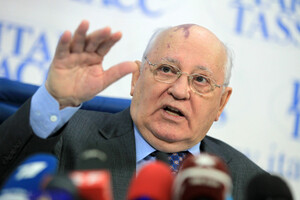The American leader called the first and last president of the USSR “a man of extraordinary vision.”

US President Joe Biden reacted to the death of 91-year-old Mikhail Gorbachev, whose policies accelerated the destructive processes in the USSR and eventually collapsed it. He called Mikhail Gorbachev called “a man of extraordinary vision.” Biden's statement was published on the White House website.
“When he came to power, the Cold War had been going on for almost 40 years, and Communism had been going on for even longer, with devastating consequences. Few high-ranking Soviet officials had the courage to admit that things needed to change. As a member of the Senate Foreign Relations Committee, I saw him do this and more. As leader of the USSR, he worked with President Reagan to reduce the nuclear arsenals of our two countries, to the delight of people around the world who prayed for an end to the nuclear arms race. After decades of brutal political repression, he adopted democratic reforms. He believed in glasnost and perestroika – openness and perestroika – not as simple slogans, but as a way forward for the people of the Soviet Union after many years of isolation and deprivation,” said Biden's statement.
He called the policy Gorbachev “with the actions of a rare leader” and believes that Gorbachev imagined a different future and risked his career to achieve it and, as a result, influenced the creation of a safer world.
“Even years after leaving office, he was still deeply involved. When Mr. Gorbachev visited the White House in 2009, he and I spoke at length about our countries' ongoing work to reduce the nuclear stockpiles of the United States and Russia. It was easy to see why so many people around the world held him in such high esteem. – added the US president. – We express our deepest condolences to his family and friends, as well as to people around the world who benefited from his belief in a better world.”
Read also: Mikhail Gorbachev's death: how the world reacted
It will be recalled that Gorbachev carried out numerous reforms and campaigns that accelerated the destructive processes that existed in the economy and politics of the USSR at the time, and led to its disintegration. He conducted a course on improving relations with the USA and Western Europe. The withdrawal of troops from Afghanistan, the fall of the Berlin Wall, the victory of democratic forces in Eastern Europe, the collapse of the Warsaw Pact and the withdrawal of troops from Europe became a symbol of the USSR's defeat in the Cold War. After the signing of the Bialowieza Agreements on December 25, 1991, Mikhail Gorbachev resigned as head of state.
During the last years, Gorbachev lived in Berlin, from where he continued to monitor politics. Gorbachev supported Russian President Vladimir Putin's aggression against Ukraine and accused the US and the West of a “new Cold War”. He also approved the annexation of Crimea and claimed that he would have done the same in Putin's place.
Related video
In Germany, a politician criticized the effectiveness of NATO in ensuring the security of Europe and claimed that the “Russian-German partnership” should be the guarantee of Europe's security. Despite this, in the Russian Federation, Gorbachev remained an undesirable person and was subject to merciless criticism.




